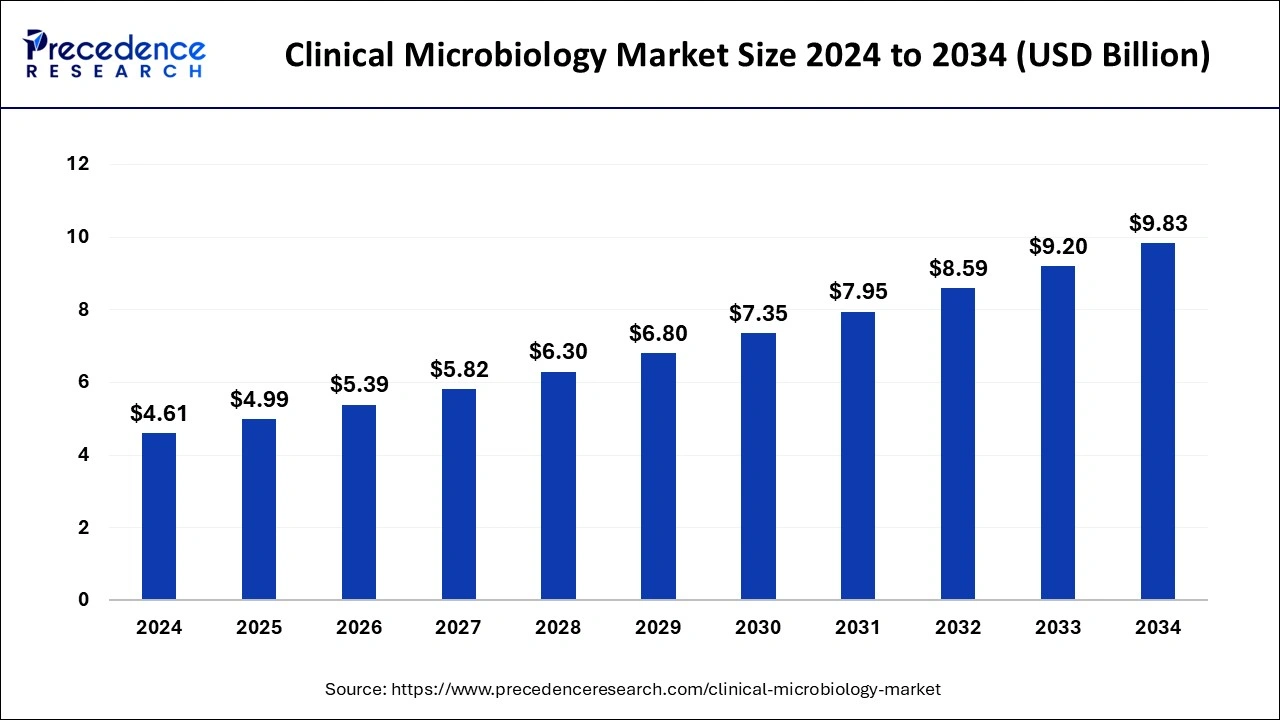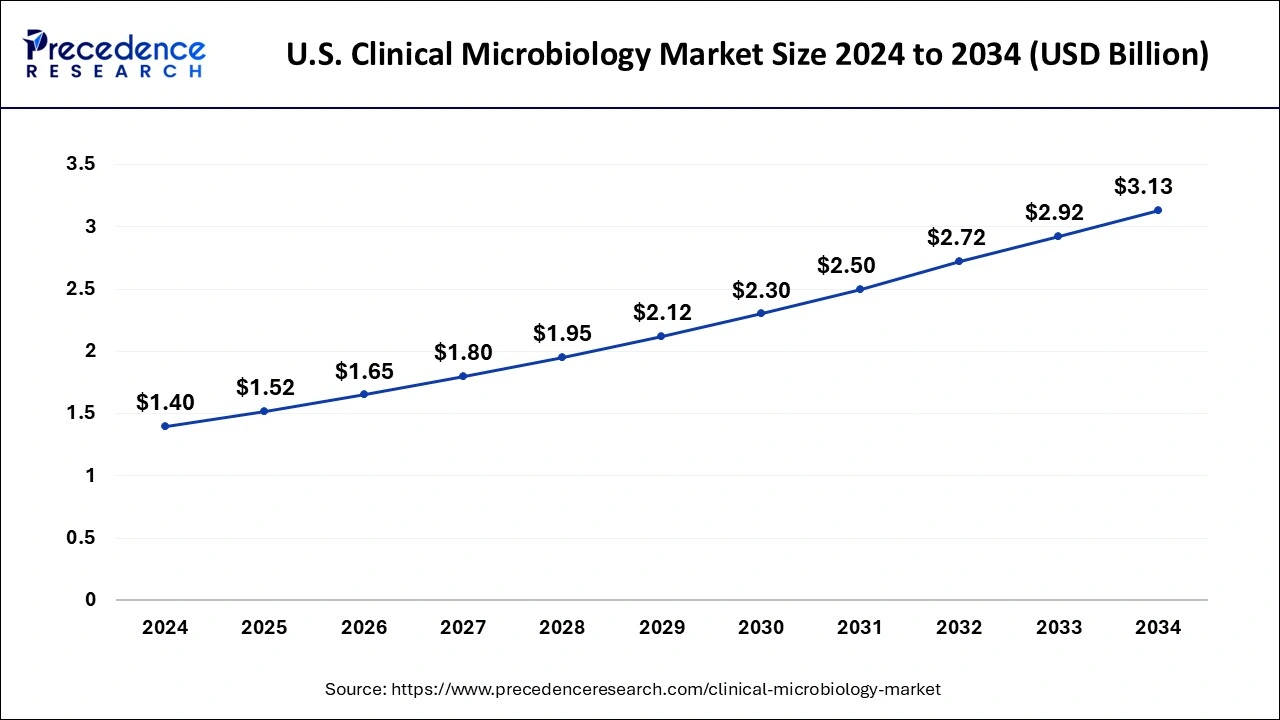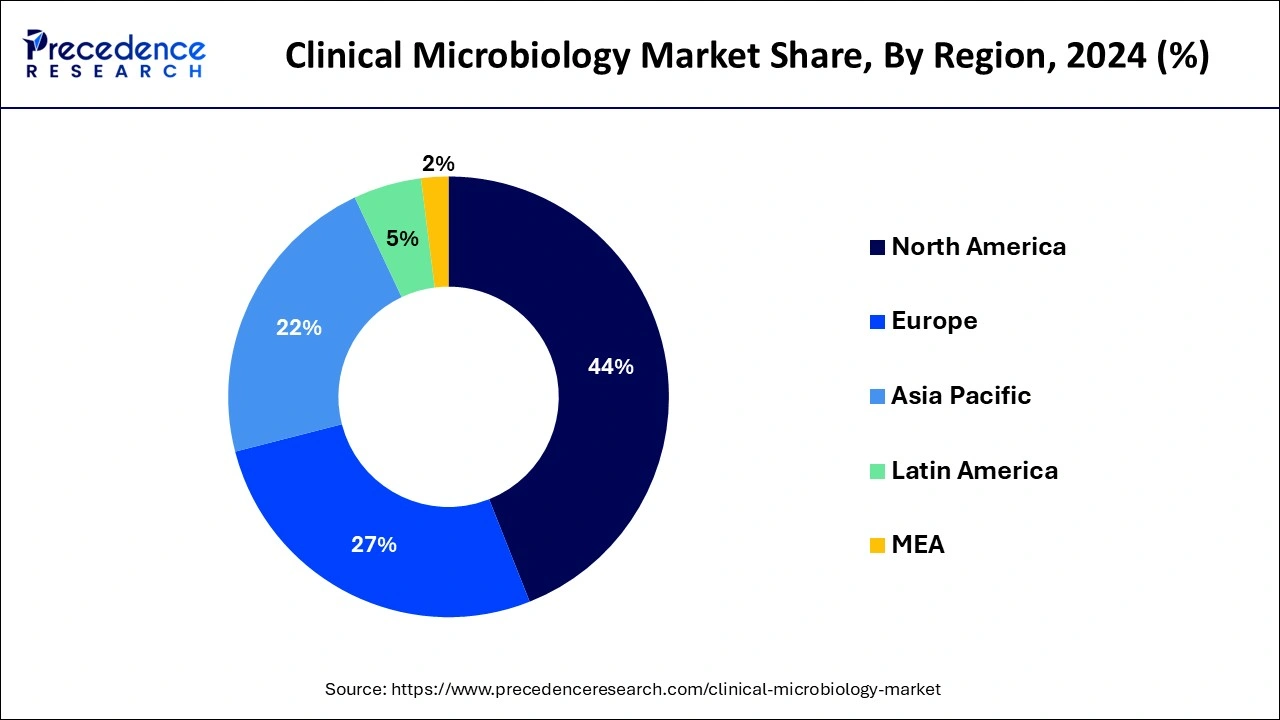March 2025
The global clinical microbiology market size is accounted at USD 4.99 billion in 2025 and is forecasted to hit around USD 9.83 billion by 2034, representing a CAGR of 7.87% from 2025 to 2034. The North America market size was estimated at USD 2.03 billion in 2024 and is expanding at a CAGR of 7.90% during the forecast period. The market sizing and forecasts are revenue-based (USD Million/Billion), with 2024 as the base year.
The global clinical microbiology market size was calculated at USD 4.61 billion in 2024 and is predicted to reach around USD 9.83 billion by 2034, expanding at a CAGR of 7.87% from 2025 to 2034.

The U.S. clinical microbiology market size was evaluated at USD 1.40 billion in 2024 and is projected to be worth around USD 3.13 billion by 2034, growing at a CAGR of 8.38% from 2025 to 2034.

On the basis of geography, North America dominates the market, largely driven by the factors such as the high prevalence of infectious diseases, the presence of advanced healthcare infrastructure, and the availability of funding for research and development. The United States dominates the market in this region. In the United States, the clinical microbiology market is dominated by large players, such as Becton, Dickinson and Company, bioMérieux SA, Thermo Fisher Scientific Inc., and Danaher Corporation, among others. These companies are developing and providing advanced diagnostic technologies and products for detecting and managing infectious diseases.

The region in Asia-Pacific is anticipated to have the greatest CAGR because the increasing incidence of infectious diseases, the growing healthcare expenditure, and the presence of a large population base are driving the market growth in this region. Countries such as China, India, and Japan are major contributors to the market growth in this region. The market presents significant growth opportunities for players developing and providing advanced diagnostic technologies and products.
In India, the clinical microbiology market is dominated by large players, such as Abbott Laboratories, bioMérieux SA, and Roche Diagnostics. These companies are developing and providing advanced diagnostic technologies and products for detecting and managing infectious diseases. For instance, in July 2021, bioMérieux SA announced the launch of the VITEK MS, a mass spectrometry system for identifying microorganisms. The system is designed to provide fast and accurate identification of microorganisms, including bacteria, yeast, and fungi.
The clinical microbiology market uses laboratory techniques to diagnose and monitor infections caused by microorganisms such as bacteria, viruses, fungi, and parasites. This includes the use of traditional culture-based methods as well as newer molecular techniques such as PCR, next-generation sequencing, and mass spectrometry. Furthermore, the clinical microbiology market has several important applications in diagnosing, treating, and preventing infectious diseases and research.
The market provides products and services such as diagnostic testing, antibiotic susceptibility testing, blood culture testing, microbial identification, and research support. Furthermore, the increasing prevalence of infectious diseases, growing demand for advanced diagnostic techniques, and rising awareness among healthcare professionals about the benefits of early diagnosis and targeted therapy are expected to drive the growth of the clinical microbiology market.
Rising awareness among healthcare professionals is expected to propel the market. Furthermore, the growing demand for advanced diagnostic techniques that provide rapid and accurate results, such as molecular diagnostics and mass spectrometry, is predicted to drive market expansion. Healthcare-associated infections (HAIs) are a major concern for healthcare providers and patients. The growing awareness of the importance of infection control has fueled the growth of the global clinical microbiology market over the last few decades.
However, over the forecast period, the limited access to testing facilities is anticipated to impede market growth. Access to clinical microbiology testing facilities may be limited to a few regions, especially developing countries. This can hinder the market's growth as healthcare providers may not have the resources to diagnose infectious diseases accurately and timely.
The lockdown measures implemented by various governments in anticipation of the COVID-19 pandemic have increased sales of clinical microbiology. The COVID-19 pandemic has created an unprecedented demand for diagnostic testing, including clinical microbiology testing. This has led to a surge in demand for molecular diagnostic tests, such as RT-PCR, which are used to detect the presence of the virus. Rising health-related issues have contributed to increased global sales of the clinical microbiology market.
The need for technologically advanced clinical microbiology is the factor that propelled the market demand. The various factors are helping to drive the market are:
| Report Coverage | Details |
| Market Size in 2025 | USD 4.99 Billion |
| Market Size by 2034 | USD 9.83 Billion |
| Growth Rate from 2025 to 2034 | CAGR of 7.87% |
| Largest Market | North America |
| Base Year | 2024 |
| Forecast Period | 2025 to 2034 |
| Segments Covered | Instruments, Disease Area, Application, and End-User |
| Regions Covered | North America, Europe, Asia-Pacific, Latin America, and Middle East & Africa |
Growing technological advancement to brighten the market prospect
Technological advancements are one of the major drivers of the demand for clinical microbiology testing, as they enable faster, more accurate, and more reliable diagnoses of infectious diseases. The advanced automated microbial identification and susceptibility testing systems offer faster and more accurate results than traditional manual methods. These systems use advanced technologies, such as mass spectrometry and molecular diagnostics, to identify microorganisms and determine their antibiotic susceptibility.
For instance, the VITEK MS system from bioMérieux is an automated mass spectrometry-based system that can identify various microorganisms in minutes. Similarly, the Phoenix Automated Microbiology System from BD can perform microbial identification and susceptibility testing fully automatedly, providing fast and accurate results.
Furthermore, next-generation sequencing (NGS) is a powerful microbial identification and characterization tool. NGS can provide a comprehensive view of the microbiome, including the presence of pathogenic microorganisms and their genetic characteristics. This technology is used in clinical microbiology to diagnose infectious diseases and detect antibiotic resistance. For instance, the Illumina MiSeq platform is a widely used NGS system that can be used for clinical microbiology applications. It can sequence many samples quickly, providing highly accurate results.
Growing awareness of the importance of infection control
Infection control is becoming increasingly important in healthcare settings as the prevalence of healthcare-associated infections (HAIs) continues to rise. HAIs are infections that patients acquire during receiving healthcare, and they can have serious consequences, including increased morbidity and mortality, longer hospital stays, and higher healthcare costs.
The growing awareness of the importance of infection control is driving demand for clinical microbiology testing, as these tests can help to identify and prevent the spread of infectious agents. the growing awareness of the importance of infection control is driving demand for clinical microbiology testing as healthcare providers seek to prevent the spread of infectious agents and reduce the incidence of HAIs. As technology continues to evolve and new products are developed, the requirement for clinical microbiology demand will also increase.
Key Market Challenges:
Limited access to testing facilities is causing hindrances to the market
In many parts of the world, particularly in developing countries, access to clinical laboratories and diagnostic facilities is limited, resulting in a lack of testing infrastructure for infectious diseases. This poses a significant challenge in diagnosing and managing infectious diseases, leading to delayed treatment, increased morbidity and mortality, and higher healthcare costs.
Inadequate funding and resources for healthcare systems in developing countries are among the main reasons for the limited access to testing facilities. In many cases, laboratories lack the trained personnel, equipment, and reagents required to perform clinical microbiology testing. In addition, a lack of transportation infrastructure and storage facilities can also hinder the delivery of samples to testing facilities, further contributing to limited access to testing.
Key Market Opportunities:
These are the following factor which is likely to create opportunity over the forecast period.
Clinical microbiology is segmented into laboratory instruments, microbial analyzers, and reagents based on disease area. Laboratory instruments are expected to grow exponentially over the forecast period due to various factors, such as the increasing prevalence of infectious diseases, technological advancements, automation of laboratory processes, emphasis on point-of-care testing, and growing healthcare expenditure.
Furthermore, the rising prevalence of infectious diseases, such as COVID-19, tuberculosis, and pneumonia, drives the demand for laboratory instruments in the clinical microbiology market. These instruments are used for the rapid and accurate diagnosis of these diseases, which is critical for effective treatment.
On the basis of disease area, clinical microbiology is segmented into respiratory diseases, bloodstream infections, gastrointestinal diseases, sexually transmitted diseases, urinary tract infections (UTIs), and periodontal diseases. Respiratory diseases are expected to grow exponentially over the forecast period. Respiratory diseases, such as pneumonia, bronchitis, and tuberculosis, are caused by various microorganisms, including bacteria, viruses, and fungi, and require an accurate diagnosis for effective treatment. Clinical microbiology is critical in diagnosing respiratory diseases by identifying the causative microorganism and determining its antibiotic susceptibility.
On the basis of application, the clinical microbiology market is divided into pharmaceutical applications, clinical applications, food testing applications, energy applications, chemical and material manufacturing applications, and environmental applications, with pharmaceutical applications accounting for most of the market. This is due to the development new antibiotics for producing vaccines and immunomodulatory drugs. These applications are crucial in preventing, diagnosing, and treating infectious diseases, posing significant global public health challenges and boosting demand for the clinical microbiology market.
On the basis of end-user, the clinical microbiology market is divided into hospitals & diagnostic centers, custom lab service providers, and academic and research institutes, with hospitals & diagnostic centers accounting for most of the market. Clinical microbiology tests are essential for diagnosing and treating hospitalized patients' infectious diseases. Hospitals & diagnostic centers have in-house clinical microbiology laboratories that perform diagnostic tests on patient samples, including blood, urine, respiratory secretions, and other body fluids. These tests are used to identify the presence of infectious agents, determine the appropriate antibiotic therapy, and monitor the response to treatment.
By Instruments
By Disease Area
By Application
By End-User
By Geography
For inquiries regarding discounts, bulk purchases, or customization requests, please contact us at sales@precedenceresearch.com
No cookie-cutter, only authentic analysis – take the 1st step to become a Precedence Research client
March 2025
February 2025
February 2025
January 2025